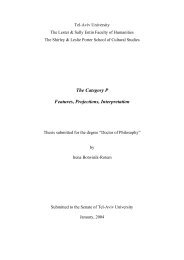Personalized Medicine “It doesn't get more personal than this.â€
Personalized Medicine “It doesn't get more personal than this.â€
Personalized Medicine “It doesn't get more personal than this.â€
You also want an ePaper? Increase the reach of your titles
YUMPU automatically turns print PDFs into web optimized ePapers that Google loves.
From left: Hen Roznek, Reuel<br />
Shualy and Toam Semel<br />
I prefer complex art which reflects the<br />
wider realities and talks about universal<br />
issues away from everyday matters.”<br />
Among the first crop of 24 students<br />
to graduate last year was Hen Roznek,<br />
26, who is now incorporating the interdisciplinary<br />
knowledge she gained in<br />
the program into master’s studies at the<br />
Department of Geography and Human<br />
Environment. For her study clusters<br />
in the BA program, Hen combined<br />
history and psychoanalysis to<strong>get</strong>her<br />
with cinema and general arts studies.<br />
In the army she served as a cultural correspondent<br />
for the popular IDF radio<br />
station, and thus launched a career in<br />
journalism at an early stage. It was <strong>this</strong><br />
interest in culture that tipped the scales<br />
in favor of the Rich Program, says Hen.<br />
Hen took courses in a wide range of<br />
subjects including bible, architecture,<br />
Buddhism and feminism, among others,<br />
but history was always dominant for<br />
her, she says. She wrote three seminar<br />
papers on cinema in the First World<br />
War. “I needed a strong background in<br />
history and cinema to be able to give an<br />
historical perspective,” she says.<br />
For Hen the added value of the program<br />
was belonging to a special group<br />
within the university. “Students in the<br />
program stick to<strong>get</strong>her, study to<strong>get</strong>her<br />
and attend enrichment activities to<strong>get</strong>her,<br />
including museum visits, opera,<br />
meetings with intellectuals and artists,<br />
and architectural tours,” she says.<br />
Cultural connections<br />
While Hen pushes on with her career<br />
as a journalist, program graduate<br />
Toam Semel, 24, feels she gained from<br />
the program’s abundant possibilities.<br />
Hailing from a family of art curators,<br />
Toam believes that the place of<br />
culture in our lives is of paramount<br />
importance. “Everything boils down<br />
to culture eventually,” she says. “Even<br />
when it comes to friendships, most of<br />
the time we connect to people because<br />
of their artistic preferences. From these<br />
connections we see how art reflects life.”<br />
Toam believes that the program –<br />
which for her involved studying philosophy,<br />
psychoanalysis and linguistics to<strong>get</strong>her<br />
with<br />
c i n e m a<br />
and music<br />
– enables<br />
s t udent s<br />
to k e e p<br />
processing<br />
ideas. “You<br />
can keep<br />
growing and experimenting with new<br />
ideas and areas. It’s not, say, psychology,<br />
where you learn a fixed profession,”<br />
she says.<br />
From film to bible<br />
Or Cohen, 28, a program graduate,<br />
studied in the film track at high school<br />
and wanted to pursue film studies at<br />
university. He was attracted to the<br />
program because it offered him wider<br />
choices. By his second year, he began<br />
All students in Israel should<br />
pursue liberal arts degrees<br />
before proceeding on to<br />
professional degrees.<br />
2012 Issue<br />
TEL AVIV UNIVERSITY REVIEW<br />
drifting away from film toward Bible<br />
and Hebrew studies. “I began reading<br />
the bible auto-didactically during the<br />
army and connecting to Jewish history,”<br />
he says. “Maybe I was looking for my<br />
roots, for the basics.”<br />
Or believes that all students in Israel<br />
should pursue liberal arts degrees before<br />
proceeding on to professional degrees.<br />
“Before you professionalize you have<br />
to have the basics in order to think<br />
critically.”<br />
Reuel says that the Rich Program<br />
allows students to choose from so many<br />
departments. “I have done courses in<br />
East Asian studies, philosophy, theater,<br />
art, film, history and in my third year<br />
I started to connect eastern philosophy<br />
with Ancient Near East studies. One of<br />
the questions that concerned me was<br />
how to apply Michael Foucault’s theory<br />
of sexuality to the hero in the ancient<br />
Mesopotamian Epic of Gilgamesh.”<br />
If all <strong>this</strong> seems like a supermarket of<br />
ideas Dr. Milner stresses that the program<br />
is highly structured and provides<br />
close guidance to the students. “We<br />
want them to experiment, but we don’t<br />
want them to <strong>get</strong> lost,” she says. “We<br />
accompany them closely and make sure<br />
they choose and<br />
concentrate in<br />
the right fields<br />
for them.”<br />
The program<br />
is funded by<br />
the Marc Rich<br />
Foundation for<br />
Education, Culture and Welfare, a Swiss<br />
foundation based in Lucerne, with offices<br />
in Tel Aviv and Switzerland. The foundation<br />
supports a wide range of initiatives<br />
in Israel and internationally. Its founder,<br />
Marc Rich, a major TAU benefactor,<br />
received a TAU honorary doctorate in<br />
2009 in recognition of his extensive<br />
philanthropic activities. The Marc Rich<br />
Foundation also supports doctoral fellowships<br />
at TAU. The Managing Director of<br />
the Foundation is Avner Azulay.<br />
15

















